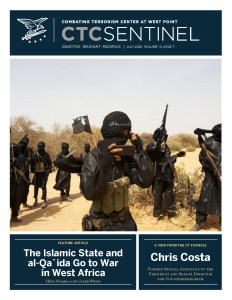From the Editor
Earlier this month, the United Nations monitoring team that tracks the global jihadi threat warned the Security Council that “ISIL franchises in West Africa and the Sahel continued to enjoy operational success in early 2020, as have those of Al-Qaida, heightening international concern about stability in the region.” Concern over the threat has grown despite the fact that a year ago clashes erupted between the Islamic State and al-Qa`ida franchises in the region, turning what had been an often amicable and sometimes cooperative relationship into fighting between them in Mali and Burkina Faso.
In our feature article, Héni Nsaibia and Caleb Weiss assess that a number of factors ended the “Sahelian anomaly” of amicable relations between the regional Islamic State and al-Qa`ida groupings, “including the hardening of ideological divisions, pressure from Islamic State Central for its regional satellite to take on a more confrontational approach toward its rival, and tensions created by the growing ambition of the Islamic State affiliate in the Sahel.” They note that “while some argue that fighting between jihadi groups is positive for the counterterrorism landscape, it is also possible that the two groups are in effect engaging in a process called ‘outbidding,’ wherein a group aims to show ‘greater resolve to fight the enemy than rival groups.’”
Our interview is with Chris Costa, who during the first year of the Trump administration served as the Special Assistant to the President and Senior Director for Counterterrorism.
Building on a study of terrorist recidivism in Belgium by Thomas Renard published in the April issue of CTC Sentinel, Robin Simcox and Hannah Stuart examine the problem set created by jihadi prisoners in Europe from two different angles. Firstly, they examine the nature of the threat by analyzing a dozen alleged jihadi terror plots and attacks that occurred inside and outside prisons in Western Europe since 2014 in which at least one of the attackers/plotters had been convicted in Europe of a previous terrorism offense. Secondly, they look at the scale of the threat by calculating the rates of various forms of recidivism from a comprehensive database relating to U.K. jihadi terror activity.
Amarnath Amarasingam and Marc-André Argentino assess the emerging security threat posed by the QAnon conspiracy. They write: “A survey of cases of individuals who have allegedly or apparently been radicalized to criminal acts with a nexus to violence by QAnon, including one case that saw a guilty plea on a terrorism charge, makes clear that QAnon represents a public security threat with the potential in the future to become a more impactful domestic terror threat. This is true especially given that conspiracy theories have a track record of propelling terrorist violence elsewhere in the West as well as QAnon’s more recent influence on mainstream political discourse.”
Paul Cruickshank, Editor in Chief
 Skip to content
Skip to content

